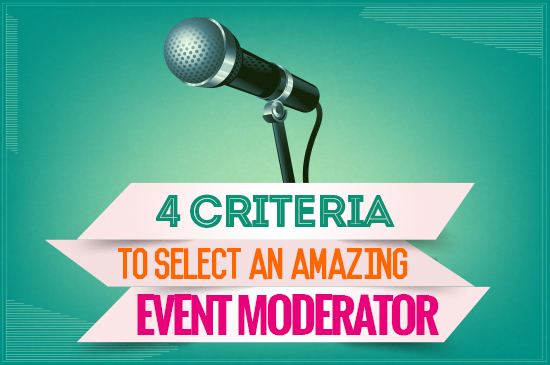Skift Take
There are four kinds of moderators to choose from:
Chemistry is a simple thing. The right mix of elements will get you a chain-reaction, leading to whatever you want: heat, cold, light, electricity, oxygen… even explosion or fireworks. But when it comes to meetings and events, this chemistry turns out to be not all that easy.
The ingredient of moderation, for instance, is one to be added with great care. Throw in the wrong meeting-moderator and your event will turn into a tasteless, colourless and useless bowl of sludge.

On the bright side: with a few simple selection-criteria, moderation will add just that little bit of extra power every meeting needs.
Unique Characteristics
When choosing an event moderator, the main thing is to know that not all moderators are alike. Having seen one of the many professionals in the industry excel, doesn’t mean that same professional is capable of making your event a success. So simply hiring only on the basis of a previous performance is not a guarantee.
Contrary to what most self-employed moderators like to make you believe, they are not the best option for every meeting in this universe. Every meeting-moderator has his/her unique characteristics…and so does your event! You put a great deal of effort in making your meeting brilliant; then why in general is no effort at all put into fine-tuning the moderation?
So, in getting the right match between your meeting and the moderator, what do you take into consideration? There’s four important criteria: skills, personality, type of event and relation to the subject. Let’s take a look at them, one-by-one.
Skills
Meeting-moderation is a very diverse profession. So diverse that no moderator can excel at all skills involved. A true professional will probably never score under 7 out of 10, but will score 8 or even 9 on only a few aspects of moderation. By looking at the required skills on every occasion, you will be able to make the match add up to a maximum score.
If you take a closer look at your schedule, you can determine what is the central skill that adds most value to the end result. You might be looking for a great debater, interviewer, interaction facilitator, master of ceremony, panellist, Q&A moderator, timekeeper, improviser etc.
Furthermore, you will have to look into combinations. A programme hardly ever will be built on only one moderating skill. The trick here is to value every skill involved and then find a moderator that will score the highest possible average on these.
For instance if you have a programme involving some interactive formats, a debate and a panel, it is crucial to know which part is the most important one. If it is the interaction, find a moderator scoring 95% on that one and 70-80% on the others.
Personality
Your moderator may have all skills required, but if the audience simply doesn’t like him, all’s for nothing. That’s why it’s crucial to match the moderators’ character to that of your guests. You should be aware of the fact, that every human being (and yes, a moderator is a human being) has a ‘default setting’.
This means, that a moderator can make small changes to who he is and how he acts, but can not become a different person. So a moderator connecting perfectly with a room full of civil servants, may well have a poor relationship with a group of salesmen.
To get a maximum score on your objectives, you may need to make a choice between dominant and modest, friendly and sharp as a razor, dynamic or laid back, provocative or inviting, funny or analytic.
And once again, this is not a one-dimensional choice. Your moderator will have to be able to perform a few characteristics in the course of the day. He will have to change his tone, pace and style, going with the flow of the meeting design. So you will have to find that one person, that can do all that is needed, within his default settings. And maybe at the end of the process, you will have to remodel some details in your meeting design to fit in these boundaries.
Type of Event
Basically, there’s many types of events: congress/conference, (political) debate, stakeholder consultation, award show, boardroom meeting, brainstorming session, event for staff or clients, etc. And basically, every moderator has formats he loves and hates (although he will probably never admit hate, since he wants to get the job).
You should take into account, if it’s an award show full of happy people you’re organising or a town hall meeting with an angry mob. The first will be well-executed by someone with ‘showmanship’. For the second one, you are looking for the relation-therapist kind of person.
Sometimes, you have a mixed format. A seminar based on content in combination with an award-ceremony, for instance. In that case it is up to you to decide, which is leading: do you go for the seminar-star, who will manage the award-part just fine? Or the award-lover, who will not ruin your seminar?
Relation to the Subject
– the well-trained and seasoned professional
– the candidate from within the organisation
– the expert in the field
– the celebrity
Multiple profiles can be sometimes found in one person: the internal candidate can also be an expert on the subject; a celebrity can well be a professional moderator at the same time.
The main thing for you, is to decide what you expect from the role of the moderator, and how this relates to his knowledge of the topic.
On some occasions, it’s very important the moderator knows the subject, on some the layman’s view will add value. Sometimes, someone from within the organisation will get the best connection to the participants, sometimes the neutral outsider will do the trick. Maybe a celebrity will get your guests in the right mood, maybe a professional moderator will make them feel taken seriously.
In Conclusion
The one-fits-all moderator does not exist. In order to make every meeting a success, you will have to do your homework, over and over again. Chemistry can do wonders, if practised well but unless undertaken with great care, it will only bring disaster.





